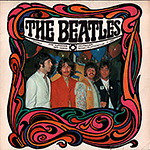


Deutscher Schallplattenclub Label
The Beatles (A.K.A. "Balloon Cover") German Record Club Edition (H 052)
(Update: 29th. July 2018)





 Original Sleeve |
|
| TITLE | The Beatles |
||||
| CATALOG NUMBER | H 052 |
||||
| RELEASE DATE | 1967 / First Press: Regular German record
club version |
||||
| TRACK LISTING | SIDE 1 | SIDE 2 | |||
| Eight
Days A Week |
Girl |
||||
| Rock And Roll
Music |
Elenor Rigby |
||||
| No Reply |
Things We Said Today |
||||
| And
Your Bird Can Sing |
Yellow Submarine (cover:
mispelt Submarin) |
||||
| Good
Day Sunshine |
If I Fell |
||||
| All My Loving |
Michelle |
||||
| And I Love Her |
I Should Have Known
Better |
||||
| A Hard Days Night | Dr. Robert | ||||
| FRONT --> Click! | BACK --> Click! | SIDE 1 --> Click! | SIDE 2 --> Click! | DISK | |
 |
 |
 |
 |
 |
|
| INNER SLEEVE | FRONT
COVER
CLOSE UP |
||||

|
 |
Housed in the original unique
picture sleeve featuring a picture of the band with a multi coloured
border around them H052. |
|||
| BACK COVER CLOSE UP | |||||
 |
Song title "Yellow
Submarine" was misspelled on the back as "Yellow Submarin". |
||||
| BACK COVER CLOSE UP | |||||
 |
 |
||||
 |
Umschlaggestaltung (Cover
design:): Werner G. Krüger. |
||||
| LABEL CLOSE UP | |||||

|

|
 |
The labels are red in colour with
"Deutscher Schallplattenclub Eine Aufnahme Der Odeon" text accross
the centre. Catalogue number H 052 is to the left of the spindle hole. |
||
| LABEL CLOSE UP | |||||
 |
 |
 |
On both sides, "GEMA" logo in a box
and "MADE IN GERMANY" were printed on the label. "Hergestellt bei der Carl Lindström GmbH" = made by Carl Lindström GmbH |
||
|
OTHER
ITEM
|
|||||
| - | |||||
| |
|||||
| LABEL | Red Deutcher
Schallplattenclub label type-2 |
||||
| MIX | STEREO |
||||
| MATRIX
No. |
SIDE 1 | 12PAL
4184-SM-1 |
|||
| SIDE 2 | 12PAL
4185-SM-1 |
||||
| VINYL COLOR | BLACK |
||||
| RECORD COMPANY'S NAME | Odeon |
||||
| RECORDING PUBLISHED CREDIT | - |
||||
| COVER FORM | Single type. Housed in a fully laminated German-printed cover | ||||
| PRINTER CREDIT | - |
||||
| COVER DESIGN/ PHOTO/ NOTES | Front Cover design:
Werner G. Krüger. ront cover photo: laenderpress (Our World broadcast June 25 1967) |
||||
| INNER SLEEVE | plain white sleeve (maybe) | ||||
| PRODUCER | George Martin
|
||||
| COMMENTS | German Record Club
Edition. 1967 German-pressed 16-track stereo LP issued excluvely for Deutscher Schallplattenclub mail order. Only the club-members had the Chance to buy that record. Manufactured by the Carl Lindström GmbH (*). The labels are red in colour with "Deutscher Schallplattenclub Eine Aufnahme Der Odeon" text accross the center, and the word "STEREO" was added. Matrix Numbers are machine stamped. They both end -1 indicating that this copy was among the first batch pressed. The matrix numbers are as follows: Side-1: 12PAL 4184-SM-1 Side-2: 12PAL 4185-SM-1 Housed in its orginal soft, fully laminated German-printed cover. The front of the sleeve has the original unique picture featuring a picture of the band with a multi coloured border around them. The back of the sleeve has the tracklisting in English and a brief biography of the band in German. Again the Schallplatten logo can be found at the bottom of the sleeve. There are two variations, 1. Regular German record club version: The 'regular' German version of this album with the catalogue number H052. 2. Swiss Record Club version : pressed for export and was only available via the Swiss mail order Record Club hence the H052/3 catalogue number. (*)Carl Lindström A.G. was a global record company founded in 1893 and based in Berlin, Germany. Founded by Carl Lindström (1869–1932), a Swedish inventor living in Berlin, it originally produced phonographs or gramophones with the brand names "Parlograph" and "Parlophon" and eventually began producing records as well. It became the holding company for Odeon Records, Parlophone Records (originally "Parlophon"), Beka Records, Okeh Records, Fonotipia Records, Lyrophon, Homophon, and other labels. Lindström sold the company to Max Straus (Odeon co-founder), but Lindström remained with the company as an engineer and inventor. The introduction of electrical recording with microphones and mixing consoles put Lindström at a disadvantage and they sold the company in 1926 to the Columbia Graphophone Company which had rights to electrical recording technology. In 1931, Columbia Graphophone merged with the Gramophone Company to form EMI with the labels retaining their identities. EMI's German unit in 1931 was originally called "Lindström-Electrola" after the merger. Parlophone became a major powerhouse in the EMI portfolio of labels thanks to the company's signing in 1962 of The Beatles. |
||||
